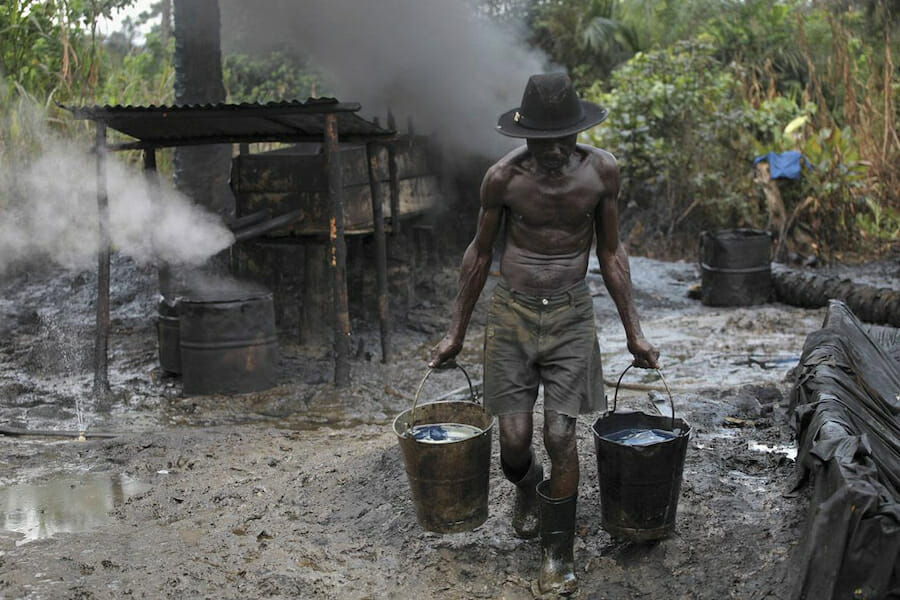
Oil Theft in Nigeria
Today, black is the new gold, especially in Nigeria. It is Africa’s largest oil producer and the 13th largest in the world. However, Nigeria is facing a major problem. Oil is being stolen at an industrial scale of 100,000 barrels every day costing the country over $8 billion in lost revenue a year. Oil theft is operated by sophisticated multinational criminal enterprises that make Nigeria’s oil industry very complicated because the lines between what is legal and illegal are becoming very blurred. According to a recent article in the Economist, to steal oil, thieves illegally tap into pipelines and other infrastructures in the oil-rich Niger Delta. They then funnel the stolen oil into small barges and boats. Some of the stolen oil is refined locally while the rest is transferred onto larger vessels and is refined elsewhere. The stolen oil is then mixed in with oil from legitimate sources and sold around the world.
Nigeria’s oil marketplace is dynamic but not very transparent. The specifics of who is stealing the oil and where it actually goes is hard to accurately estimate. However, Chatham House, a leading London think tank argues that due to the lucrative nature of the business, the key players don’t want the status quo to change. Politicians, security forces, oil workers, criminal entities, and local community leaders all seem to benefit from oil theft and thus do little to stop it.
A large-scale theft network includes security personnel, facilitators, local and foreign transport networks and a range of buyers and sellers. The profits from the buying and selling of the stolen oil is laundered by middlemen in financial hubs from New York to Singapore to Geneva. The money is deposited into the accounts of shell corporations and invested in legitimate businesses.
Effects of the Oil Theft
The effects of Nigeria’s oil theft are far-reaching. There is speculation that the oil trade helps fund other transnational criminal networks creating vital links between oil thieves, pirates and drug and arms traffickers. Also, the frequent illegal tapping of pipelines is often very crude and causes frequent pipeline leaks. This forces oil companies to shut down production while crucial repairs are conducted. As a result, Nigeria is producing 400,000 barrels a day below its capacity of 2.5 million barrels a day. That’s a lot of revenue lost in a country where 80% of government revenue is from the oil sector.
In addition, since the tapping of oil pipelines is done in a crude fashion, it causes many leaks that cause immense environmental degradation. Worse, the illegal oil refineries that dot the oil-rich Niger Delta see oil spilled everywhere soaking the ground with a mix of mud and crude that swallows the leg up to the knees. Plumes of smoke rise from the illegal refineries and spread across the landscape causing numerous health hazards. The oil soaks into the ground contaminating vital freshwater systems.
Causes of Oil Theft
There are few job opportunities for people in the Niger Delta so residents are forced into the booming illegal oil theft trade. The locals complain that the government is not investing enough money in job creation, education and other social programs to tackle the region’s poverty. In addition, they just want a piece of the pie that is bringing wealth to other regions of the country.
It is a vicious cycle. The government suffers from a shortage of funds to projects due to the loss of oil revenues, so it cannot invest in poverty programs. Complicating the problem more is a climate of corruption and managerial incompetence, which creates and fosters an environment for oil theft.
Recommendations
What can we do about it? Chatham House makes some comprehensive recommendations. In order to address the scope of the problem, there needs to be good intelligence revealing how much oil is being siphoned. This includes better data and better mapping of the ships operating in oil theft rings off of Nigeria’s coast. Next, information should be gathered on where the oil goes when it leaves Nigerian waters and how it is being mixed with oil from legitimate sources. Last of all, intelligence must be gathered on how this is being funded. So, intelligence needs to be gathered on where the money goes, who the middlemen are and where and to whom the bribes are paid.
Should the International Community Engage?
Good intelligence is needed so that international actors can assess if oil theft harms their interests. Nigeria cannot stop the flow of stolen oil on its own so it is imperative for foreign governments to play an important role. However, the Nigerian government will still have to do most of the heavy lifting. There should be some serious consideration given to labeling stolen Nigerian oil “blood oil” as with blood diamonds and bring the practice into new international laws and norms. Foreign governments could, once the major players have been identified, place sanctions upon them and freeze their assets. Though the report offers great initial recommendations it is only a first step. It is imperative that the Nigerian government be assisted in the fight against stolen oil.
The stolen oil trade problem must be tackled at its source which is unemployment and poverty. There must be a partnership between the Nigerian government and the international community to invest more and expand the legitimate oil sector. This would provide more opportunities for the local community which could benefit from their region’s rich oil resources without resorting to theft. Legitimizing and improving many of the illegal oil refineries by bringing them under the management of oil companies could also be a viable option.
Nigeria’s oil theft is a major problem in the country but there are alternative options available. It will take many years to solve but the international community must place this issue on its agenda.
